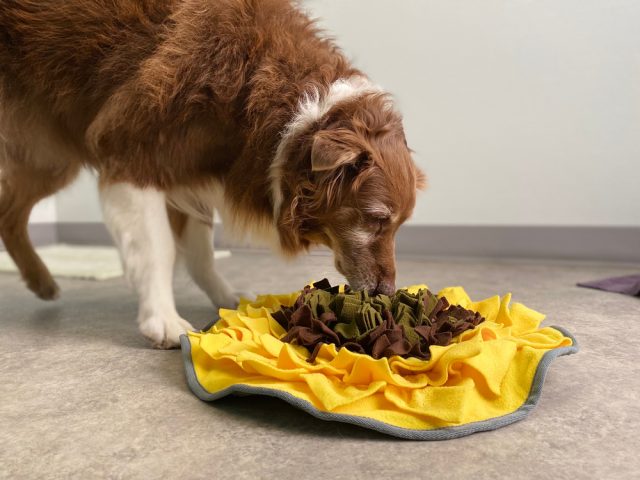It is inevitable every energetic, rambunctious puppy becomes a solid, upstanding adult and eventually a stoic, thoughtful senior. Most owners want to keep their older dogs comfortable and quiet in their twilight years.
Unless they are suffering from a medical condition that requires quiet and comfort, older dogs need slight adjustments to their daily lives. Regular checkups to the veterinarian should be kept, to keep on top of anything that might escape notice by the owner.
 1. Mind Games
1. Mind Games
Mental stimulation is required throughout a dog’s life. Whether it is a six month old puppy or a ten year old dog, all dogs need brain exercises. Some of the more low key exercises are to give the dog a puzzle toy filled with treats appropriate for a senior dog. Teach them simple tasks suited to their physical needs, such as the names of certain toys. When they learn the specific names, put a toy in another room and have them fetch the toy.
 2. Nutrition
2. Nutrition
There are many senior dog foods on the market, but not all of them are suited to maintain optimum health for older dogs. Find a food that keeps protein at the top of the list. The ingredient list should list a protein first (chicken, beef, lamb etc.) If it lists a grain first move along to the next. Another thing a senior dog needs is an appropriate level of Omega-6 which becomes more important to maintain healthy skin and coat in aging dogs. Senior dog food should also contain FOS (fructooligosaccharides) to maintain a healthy level of bacteria in the intestines. This maximizes digestion.
3. Inspections
Take a few moments every week or so to look for unusual bumps, lesions, or skin discoloration on the body. While some bumps or lesions are harmless, they should be checked by a veterinarian to rule out a tumor. Watch the dog’s gait, being mindful of a new limp or favoring of one leg over another. This could be a sign of arthritis, the onset of dysplasia, or something in the spine. Another aspect to keep an eye on is attitude. If the dog becomes aggressive, inactive, or begins to act different than normal, schedule an appointment with the vet. There might be a brain tumor developing or pain has developed somewhere.
 4. Exercise
4. Exercise
Most senior dogs aren’t up for running a marathon or hiking in the mountains; they are capable of taking a walk around the block. Walking increases circulation, it keeps joints moving and also provides another avenue of mental stimulation. Sniffing, watching, exploring all provides new avenues for the brain. Look for a group of owners who live with senior dogs and arrange play dates at a dog park. Socialization with other dogs helps with physical and mental activity.
5. Routine
Dogs thrive on routine and stability. As a dog gets older, there will be small adjustments in his daily routine, but it isn’t necessary to completely overhaul their schedule. Give them love and cherish the days with them.
 Toledo, United States.
Toledo, United States.